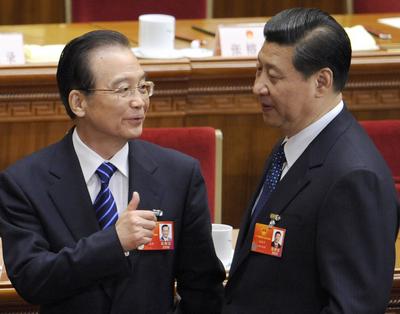This is a remarkable concordance in the birth of new stars in the political universe; a qixi or tanabata in the political heavens (wrong day I know) that will hopefully see the relationship between China and America re-consummated, with the blessing of the magpies who build the bridges or deny them between hopeful partners, as in the myth.
At the moment, the probability is that President Obama will continue as US President. The alternative candidate, Mitt Romney, is also well known. The outcome of the process that almost certainly will project Xi Jinping to the Party Chairmanship and Presidency of China and Li Keqiang to the Chinese Premiership is well known, although there is less certainty about the composition of the leadership team in the Politburo, and the Bo affair meant that there may be some unexpected bumps along the way to declaring the ballot. The process by which this outcome was determined, of course, is less clear, but perhaps less so than some would have us believe.
There’s an instinct in the western press and commentators to underline the opacity of Chinese governance around this transit in the political heavens. The contrast is certainly stark. With China now an active issue in the American electoral contest, that contrast has assumed new importance: not only in how governments might conduct their affairs with China, but also in how ordinary people that elect governments in representative political systems are led to think about how they should conduct affairs with China. The current slanging match between President Obama and Mr Romney over who’s tougher on China and who’s less compromised by being a Chinese comprador is unlikely to affect the way in which either conducts affairs with China should he win office, one hopes, but there is a deep worry that if this kind of thing continues unchecked it will corrode the psychology of the relationship and develop into a uncontrollable pathology that may lurk barely suppressed under the surface.
The Chinese political system is typically described as authoritarian. This is a description that resonates with the events in Tiananmen Square in June 1989. And it resonates too with the many thousands of protests against unjust treatment and the violations of human rights that occur in China every year. There are many dimensions of China’s system of government that are unmistakeably authoritarian. To intelligent and critical Chinese the description also has a strong ring of truth. Yet it is a description that doesn’t quite capture the system of government under which they live today and of which they have expectations for the future.
Susan Shirk has famously described the Chinese system as being run by a ‘selectorate’ — responsive to public interests and the popular will in a way that denies the authoritarian label — a description that captures its nature better than most.
Meanwhile, as Ryan Manuel argues in our lead essay this week, ‘(t)he recent hubbub over [Chinese heir apparent] Xi’s disappearance says as much about our analysis of China as it does about the Chinese regime’. While Xi’s two-week absence from public appearances led to a flurry of articles about how opaque China’s government is and how little we know about the future leadership, the idea that it threatened the legitimacy of the Chinese regime, as some suggested, was far-fetched. As Manuel points out, Xi’s absence was his third fortnight-long disappearance from the public eye this year. And although they were happy to guess at what ailed him, few Chinese commentators seem concerned by Xi’s illness, whatever it may have been.
Rather than fret overly about what is a commonplace event in the comings-and-goings of the Chinese leadership, Manuel suggests, the character of Chinese government and the deep substructure of its operation and interests are what will matter to the conduct of affairs with China over the coming years, paradoxically reflecting what analysts also might say about dealings with the United States. All the important issues have to be dealt with ‘at the appropriate lower level (duikou guanli)’. That’s a matter of getting to know ‘the appropriate level’ and what the ‘appropriate level’ is thinking and doing. And as with what’s going on in the Chinese economy, there is much that is known about that if the effort is put into analysing it and relating to it.
What we do know is that, from the top (including Wen Jiabao) to the appropriate level, many thoughtful people are thinking hard about the economic and political challenges that China faces in the years immediately ahead — in particular about the nexus between continuing economic success and political reform. Political system reform, it is increasingly understood, is deeply connected to getting China’s big economic problems sorted out. A more representative political system is likely to make that easier, and is essential to dealing with systemic corruption — an inevitable outcome of the interaction between a one-party state and getting things done in the market. The question of political reform in this system is proximately focused on making the system of governance in the Communist Party (80 million strong as it is, of course) rather than in the country more representative. Effecting political change will not be easy and hopefully China will have the international space and the understanding at home at all levels that allows it to make further progress on political reform under its new leadership.
Peter Drysdale is Editor of the East Asia Forum.


This change of leadership in China is probably one of the most crucial things to happen right now. It could affect the whole world.
China will face huge economic and political challenge in upcoming years as it seems that chinesse economy is slowly cooling down…
modernisation of political system is unavoidable in next decade.